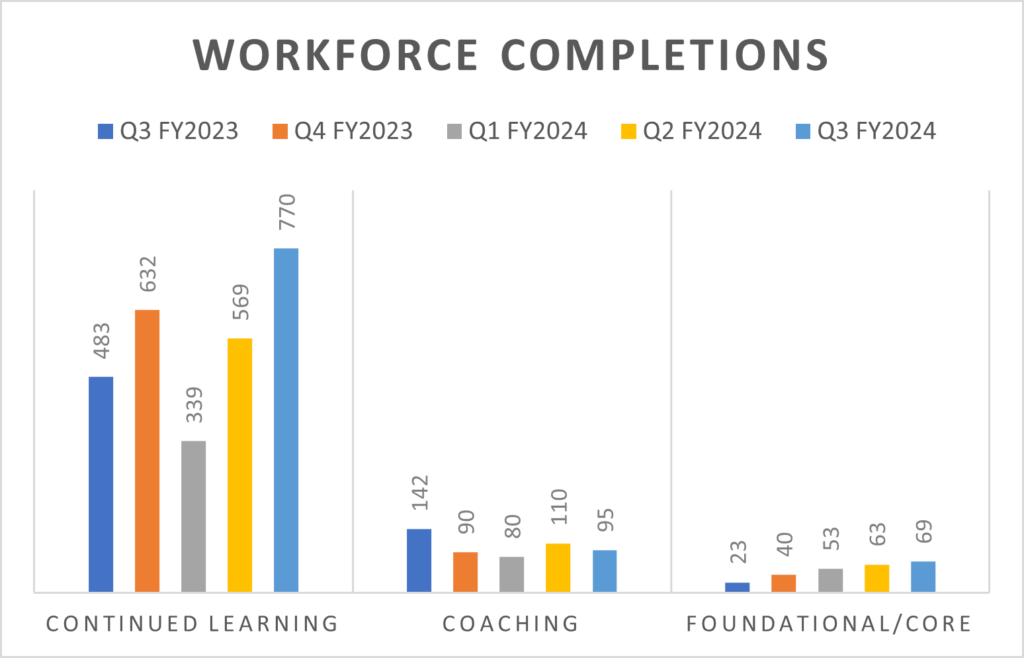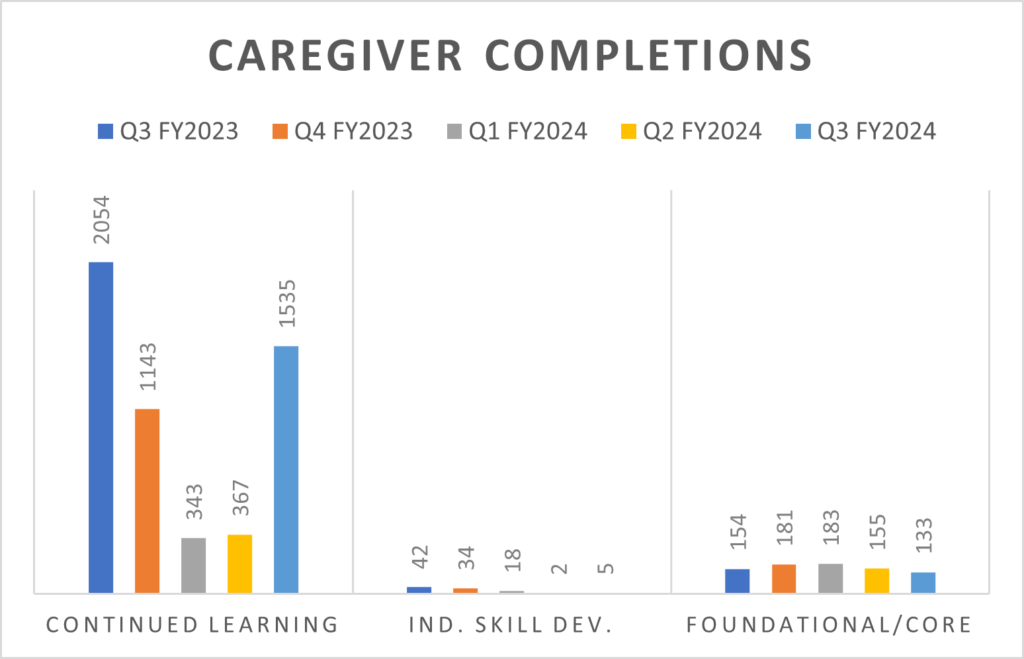Quarterly Report_Q3 FY2024
Program Updates
Workforce Core pilot
The Workforce Core pilot is a 13-week training that began Jan. 1 and continued through March 29. The training is divided into four blocks: Foundation, Engagement, Assessment, and Case Planning & Service Delivery. Each block builds on previous blocks.
Every session was observed by two to five DCYF staff from all levels of the agency. The feedback has been overwhelmingly positive from observers and learners. The curriculum is currently being revised for implementation with the participation of DCYF staff at every level.
Feedback and revisions for Foundation and Engagement blocks
Feedback surveys for these two blocks were analyzed and any proposed changes with 80% or more agreement were adopted. For proposed changes below 80%, the group met on March 6 to discuss and come to agreement on how to address. An action item list was provided to all partners to represent the decisions that were made.
Across the blocks, action items included but were not limited to:
- Address accessibility and organization;
- Increase clarity;
- Add talking points to the facilitator guides;
- Add videos or activities that increased the voice of lived experience and diverse representation;
- Increase engaging activities,
- Explore the balance between policy and practice;
- Include more opportunities for practice prior to simulation;
- Add information on self-care, self-awareness, and provide examples for all tasks; and
- Check scaffolding throughout the Block to ensure content builds upon itself.
By the Numbers
Area Administrators Summit
The Alliance hosted this year’s Area Administrators Summit on March 26 at Silver Cloud Point Ruston in Tacoma. You can view the agenda here.
- General session topics supported planning committee and leadership feedback. One keynote focused on motivating young leaders while others brought forward education around gender and inclusive workplace culture.
- Breakout content included support for working with courts and the Legislature; internal DCYF programs; mindfulness in leadership; and kinship care.
- Participants highly valued sessions on empathy in leadership, DEI and kinship support.
- Some attendees expressed interest in expanding the conference to accommodate more learning opportunities.
By the Numbers
"W-O-W!!! Very well done. Loved this session immensely. Trainer was engaging, interesting, thought-provoking, and an effective communicator."
— Attendee feedback on "Building Inclusive Workplace Cultures"
"It was the most eye-opening and informative history lesson I have ever been a part of. I learned so much and it was all very relevant to our work. His session would have made an amazing keynote."
— Attendee feedback on "Erosion of Empathy"
Foundations of MI Practice
This quarter, nine Alliance staff went through the Training of the Trainer for Foundations of MI Practice in Child Welfare and were coded to fidelity by the Centre for Collaboration, Motivation & Innovation (CCMI) using the Motivational Interviewing Competency Assessment (MICA).
Foundations of MI Practice in Child Welfare is 16 hours long and includes practice and application of skills. It will be followed by Advanced MI Training and Simulations, which is in development and 12 hours long.
Being coded to fidelity means that learners demonstrated using the intentions, strategies, and approaches in the conversation that are known to be in keeping with Motivational Interviewing. We are using the MICA, which was developed by the trainers at the Institute for Individual and Organizational Change and supported by CCMI.
There will be dry runs for internal Alliance staff for both the in-person and webinar versions of the training to try out our scenarios/edits to ensure we are meeting the needs of DCYF. We will be piloting the course for DCYF Program Managers, QPS, and Supervisors on these dates:
- 12:30-4:30 p.m. May 20-23, webinar
- 9 a.m.-4 p.m. June 5 and 6, in person at the Puyallup Office
The Alliance will continue to partner with the FFPSA group on scheduling and offering Facilitated Cohort Learning, as well as coaching and coding learners to fidelity.
Caregiver Core Training "While You Wait" pilot
The Alliance piloted a new approach to Caregiver Core Training support by offering learners the chance to participate in “While You Wait,” an existing CaRES resource. “While You Wait” was originally a standalone training that helped families awaiting licensure or first placement to consider some of the needs in the fostering community and how they are suited to meet them.
The pilot, which launched Jan. 9, brought “While You Wait” into CCT as an option that offers group support in lieu of individual support. The goal of introducing this option is to create an automatic “moving sidewalk” from CCT into CaRES support and Alliance trainings so that new caregivers are aware of and plugged into all the available resources from the beginning.
The group session content includes building a training plan to ensure they are connected to the right courses for their needs and a conversation with a Mentor so they are connected to the support options available through the program.
The pilot will continue through June 29.
By the Numbers
Foundations of Practice
The Foundations of Practice Modules are an in-person, one-day training that was developed by DCYF Program Managers to support the implementation of HB 1227 into practice for DCYF Field Case Workers. These modules were adapted by the Alliance to deepen new case worker knowledge following the completion of Regional Core Training beginning with the June 16, 2023, RCT Cohort.
There are 4 modules:
• Module 1: Removal Standards – Defining Imminent Physical Harm Using our Safety Framework
• Module 2: Harm of Removal
• Module 3: Kinship Caregivers – Identify, Locate, Inform and Evaluate
• Module 4: Preparing for Shelter Care
Of the 65 DCYF staff who responded to the evaluation survey, three quarters were from CPS Investigations, CPS FAR and CFWS programs. Learners voiced that they would benefit from clearer communication ahead of time to understand the expectations about preparation, their assigned time slot, and to have a clear picture that the simulation event was primarily designed to be an immersive courtroom experience followed by feedback and debriefing.
Regarding diversity, equity and inclusion suggestions, responses were widely positive. Some learners suggested more instruction regarding land acknowledgments, more examples of diverse family cases and more language diversity.
By the Numbers
Course Launches
Click each title for a description of courses launched this quarter.
The “Engaging Youth In Group Care” series is composed of seven modules for those working with youth in a group care setting who have moderate to severe emotional and behavioral challenges.
Foundational Module 1 helps develop an understanding of the underlying causes of a youth’s behavior, which is one of the first steps in supporting their well-being.
This multimedia-driven course will expose learners to a variety of composites of youths facing trauma and discusses how events can affect long-term behaviors.
The Inherent Strengths in Kinship Families is a training series developed by Dr. Joseph Crumbley for kinship caregivers. The series takes a strength-based perspective in outlining different topics that are unique to kinship families and providing strategies for caregivers.
This eLearning is Part 1 of a two-part introduction to service referrals. This course offers step-by-step guidance on utilizing the Service Referral tool in the FamLink case management system, specifically focusing on In-Home or Reunification service types. Participants will navigate through the basic workflow, covering the process of creating, completing, and submitting a referral for approval, and ultimately service delivery.
Through a series of interventions and strategies, learners explore how to interrupt unconscious bias and address subtle acts of exclusion. They will develop behaviors that reflect cultural competence; engage in discussions about the negative effects of stereotypes, microaggressions, and bias on effective case work; and practice courageous conversations to develop appropriate responses to these issues.
Looking Ahead
Next quarter, The Alliance will be launching these new courses:
- “Advanced Practice in Motivational Interviewing”
- “Foundations of Motivational Interviewing for Child Welfare Staff”
- “Indian Child Welfare Policy Training”
- “Informed Decisions Through Critical Thinking”
- “Introduction to Chronic Neglect” (elearning)
- “LGBTQIA+ Basics for Supporting Youth” (elearning)
- “LGBTQIA+ Youth: Guiding the Work for Licensing Staff”
- “QEW Training”
- “Understanding Chronic and Complex Neglect”
Training Summary


* A unique learner is each individual learner who has taken any class this quarter, whereas the total number of learners will count a learner each time for each course they complete. The number of unique learners includes eLearning learners.
